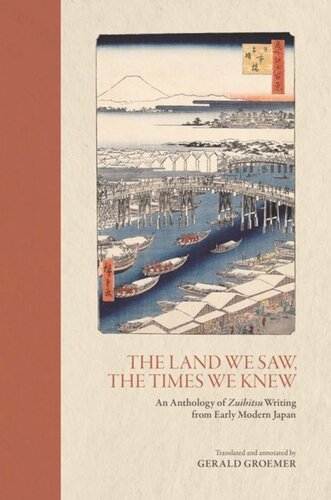

Most ebook files are in PDF format, so you can easily read them using various software such as Foxit Reader or directly on the Google Chrome browser.
Some ebook files are released by publishers in other formats such as .awz, .mobi, .epub, .fb2, etc. You may need to install specific software to read these formats on mobile/PC, such as Calibre.
Please read the tutorial at this link: https://ebookbell.com/faq
We offer FREE conversion to the popular formats you request; however, this may take some time. Therefore, right after payment, please email us, and we will try to provide the service as quickly as possible.
For some exceptional file formats or broken links (if any), please refrain from opening any disputes. Instead, email us first, and we will try to assist within a maximum of 6 hours.
EbookBell Team

5.0
78 reviewsJapanese zuihitsu (essays) offer a treasure trove of information and insights rarely found in any other genre of Japanese writing. Especially during their golden age, the Edo period (1600–1868), zuihitsu treated a great variety of subjects. In the pages of a typical zuihitsu the reader encountered facts and opinions on everything from martial arts to music, food to fashions, dragons to drama—much of it written casually and seemingly without concern for form or order. The seven zuihitsu translated and annotated in this volume date from the early seventeenth to the late nineteenth centuries. Some of the essays are famous while others are less well known, but none have been published in their entirety in any Western language.
Following a substantial introduction outlining the development of the genre, “Tales That Come to Mind” is an early seventeenth-century account of Edo kabuki theater and the Yoshiwara “pleasure quarters” penned by a Buddhist monk. “A Record of Seven Offered Treasures,” composed by a retired samurai-monk near the end of the seventeenth century, starts as a treatise on the proper education of youth but ends as a critique of the author’s own life and moral failings. Perhaps the most famous piece in the volume, “Monologue,” was drafted by the renowned Confucianist Dazai Shundai, a keen and insightful observer of life during the late seventeenth and early eighteenth centuries. Dazai treats, in turn, poetry, the tea ceremony, comic verse, music, theater, and fashion. “Nagasaki Prattle” is an entertaining record of a journey to Nagasaki by a group of Confucianists in the early eighteenth century. In “Kyoto Observed,” a mid-eighteenth-century Edo resident compares the shogun’s and the emperor’s capital in a series of brief vignettes. An 1814 zuihitsu classic written by a physician, “A Dustheap of Discourses” presents another colorful mosaic of topics related to life in Edo. The book closes with “The Breezes of Osaka,” a lively essay by a highly cultured Edo administrator contrasting the food, life, and culture of his hometown with that of Osaka, where he briefly served as mayor in the 1850s.